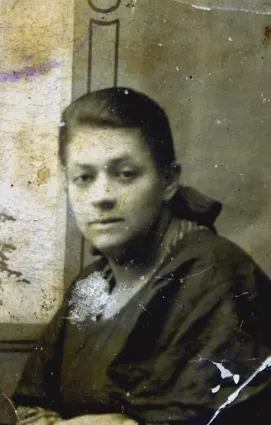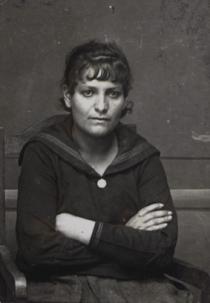This is my grandmother Shifra Birger. The picture was made in Jonava in the 1900s.
My ancestors are from a small Lithuanian town Jonava, located about 20 kilometers away from Kaunas. Jonava was very small, consisting of several streets. The population of town was mostly Jewish (editor's note: in the 1930s there were about 10 thousand Jews in Jonava). They mostly lived in the downtown area. There were their shops as well- grocery stores, cobbler and tailor shops. There were great carpenters in Jonava. Jonava cabinet-makers was famous all over Lithuania. Jews owned a small furniture mill. There was a match production workshop, where waste materials from furniture were used. There was square Liberty in the heart of the town. There were two big two-storied stone synagogues by the square. Apart Jews there were also Russians, mostly Old Believers who appeared in Jonava in the seventeenth century. Old believers lived in the suburbs. They mostly were farmers- tilled the land and bred cattle. They brought dairy products, potatoes and other vegetables in town. Poles and Lithuanians also lived in town, but there were not many of them.
Both- my paternal and maternal grandparents were cabmen. My paternal grandfather Samuel Iosif Birger was born in Jonava in the 1870s. I did not see Samuel Iosif as he died in late 1920s. My paternal grandmother Shifra was about five years younger than my grandfather. She had always been a housewife. She took care of the household and raised children. Both of my grandparents were illiterate, but very religious. None of them knew how to read in Ivrit, but they said prayers as they knew them by heart. The family was poor, but not indigent. Grandfather's earnings were enough for the family to get by. The Birgers had their own small house, consisting of three rooms, a kitchen and many larders. There was a big yard, where there was a stable with two - five horses, depending on the season. Grandfather took good care of them. Samuel Iosif did not get his children educated fairly thinking that there was no use in finishing lyceum to drive a cab with horses and transport people and luggage.
There were four children in the family of Samuel Iosif and Shifra: two daughters and two sons. Father's sister Leya was the closest in the family. She was five or six years younger than my father. Leya was the only one from the family who was literate. I do not know where she studied. She knew how to read and write in Yiddish and Russian. She read books and knew the rudiments of accounting. Leya married a local Jew Moishe Adashkis, who was in charge of fire-fighters' team of our town. Moshe, Leya and their children lived in a mansion by the fire-fighters' office and a garage with the only fire truck in town and all necessary fire-fighting equipment. Our house was right in front of Leya's one. I spent my childhood with my cousins- Rahmil and Etka, children of Leya and Moishe. Rahmil was one year older than me and Etka was about three years younger. When grandfather died, grandmother Shifra lived with Leya's family.
My father Gedali, born in 1900, was the eldest in the family. I do not know whether he went to cheder during his childhood. Even if he went there, his studies did not last long as my father was illiterate. Since young age he had helped grandfather groom the horses. He became the cabman at a rather young age after grandfather's death. He had to be the bread-winner of the family. He got married rather late, when he and mother was about thirty. It probably was due to the fact that he would not be able to provide for two families. Thus, he had to make sure that his younger siblings stood one's own feet.



















